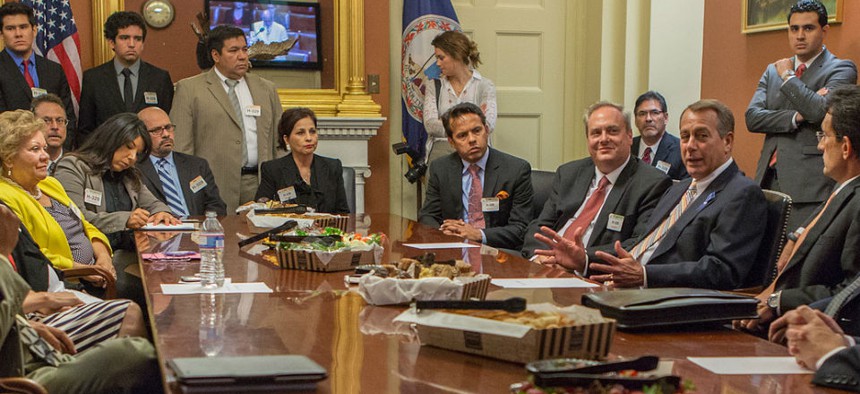
House Speaker John Boehner speaks to the National Hispanic Christian Leadership Council about immigration reform in July 2013. Office of John Boehner file photo
How Hopes for an Immigration Deal Fell Apart
In January, an agreement still looked possible. By December, the two sides were further apart than ever.
The list was just one page long. But at the end of January, that page held the key to a House Republican plan for step-by-step immigration reform.
House Speaker John Boehner circulated the draft list of GOP standards at an annual retreat in Cambridge, Md., taking the temperature of his members. But a week later, Boehner dampened expectations, saying that distrust in the president's willingness to enforce the laws would make it difficult to pass immigration legislation.
This wasn't the last time in 2014 that reforming the nation's immigration system would take a slight step forward, another big one backward, sliding all the way to the current end-of-year stalemate. President Obama has issued a controversial measure to provide work permits and deportation deferrals to millions of undocumented immigrants, because he believes Republicans were never going to send him an immigration bill. And the GOP says Obama's action has killed any chance for a bipartisan bill, and vows to spend 2015 trying to reverse his order.
Advocates for an immigration measure, meanwhile, have little confidence one can get done in the next Congress.
"There will be a lot of noise, I think, around legislation this Congress," Frank Sharry, America's Voice executive director, said at a Dec. 18. press event. "It'll be really interesting to see if Republicans can actually get from, 'We hate what the president has done' to 'We're going to try to legislate.' … I would love for them to make it hard for us to say no, I really would."
But, he said, the first window of opportunity for legislation likely won't come until after the 2016 presidential election.
Going into 2014, immigration reform appeared possible. The Senate passed a bipartisan bill in 2013, one the House said it wouldn't put on the floor. But Boehner did make his list of immigration principles in late January, and discussion was swirling around the issue. Everyone has a different theory when it all changed, when immigration legislation completely soured, when there was no turning back.
Soon after the House GOP released those draft principles, some conservatives fired back.
"Now is the time for rank-and-file House Republicans to claim the leadership mantle and to say, firmly: Our goal is to transition millions of struggling Americans from welfare and joblessness to work and rising wages," Sen. Jeff Sessions, R-Ala., said at the time. "The president has not only dismantled enforcement but has delivered for a small group of special interests and CEOs by forcing through the Senate legislation that drastically surges the future flow of new immigrant workers competing against unemployed Americans."
Boehner's pullback a week after the Cambridge retreat dashed Sharry's hopes for reform in 2014. But that didn't mean everyone stopped trying, according to Marshall Fitz, immigration policy vice president for Center for American Progress.
"There was a lot of pressure for us to declare it dead when Boehner walked it back," Fitz said, "but we know how hard it is—and we've been at this for so many years—to get legislation passed like that which was passed in the Senate, and we wanted to give it every last hope."
The conversation quietly continued among some Republicans, such as Rep. Mario Diaz-Balart of Florida, all the way into early summer, according to Fitz.
Then in June, House Majority Leader Eric Cantor lost his reelection bid to a tea-party-backed GOP primary foe, a stunning upset.
"I think one narrative is that Cantor lost because of immigration," Sen. Lindsey Graham, a member of the Senate's Gang of Eight that helped the upper chamber pass bipartisan reform, told National Journal. "I think that's not even remotely true, but people were looking for a reason. Our party has got to mature on this issue, and we're getting there actually."
But it did leave many wondering if this had spoiled reform in the 113th Congress. Almost simultaneously, a new issue came into the national spotlight.
The number of unaccompanied children crossing the U.S.-Mexico border, mainly fleeing violence and economic disparities in Central America's Northern Triangle, rose dramatically. It increased from 4,845 in February, to more than 7,000 for March and April, and more than 10,500 in May and June. Initially, it was estimated about 60,000 minors would stream the border, a prediction that later rose to 90,000.
"That, to me, was the defining moment that took the momentum away, and then you follow that with Cantor's loss," Graham, R-South Carolina, said. "The critics could say you're talking about comprehensive immigration reform, and you've got 60,000 kids dropped off on the border here. Fix that first."
For others, it came down to the rank-and-file conservatives who would oppose any measure that would give "executive amnesty" to undocumented immigrants.
"Certainly, the situation of the unaccompanied children complicated it," said Rep. Zoe Lofgren, a member of the House's secret immigration working group, which halted meetings in August 2013. "But it was basically unrelated to it. I think the main thing is that they just decided they didn't want to irritate their right wing."
On June 30, Obama announced immigration reform would still happen, but it would come directly from him. Boehner had told the president immigration legislation was dead in the House.
"While I will continue to push House Republicans to drop the excuses and act, and I hope their constituents will too, America cannot wait forever for them to act," Obama said in the Rose Garden. "That's why today I'm beginning a new effort to fix as much of our immigration system as I can on my own without Congress."
Obama aimed to complete his executive action by the summer's end, but delayed such announcement until after the midterms in a failed effort to help his Democratic colleagues in tough reelection bids. On Nov. 20, Obama told the public his plan, of which the signature program lets parents of U.S. citizens and legal permanent residents apply for three-year deportation deferrals and work permits if they have been in the country for more than five years.
The year ended with a unilateral action Republicans called "lawless" and "unconstitutional" with Sen. Ted Cruz of Texas holding up a vote on a larger spending package because he disagreed with the immigration action. Boehner promised to fight "tooth and nail" against Obama. And the chances of a bipartisan deal in 2015 look ever more remote.
NEXT STORY: Republican House Leaders Stand by Their Whip







